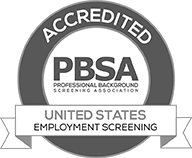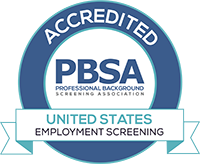BLOG
Court Decrees Applicants Must Show Actual Harm in FCRA Lawsuits
April 25, 2017
A recent decision declared that a plaintiff must allege and show harm to pursue a case in which a background investigation may have been improperly disclosed.
The Fair Credit Reporting Act (FCRA) requires employers to obtain permission before running background checks on potential or existing employees. To begin, the employer must provide a disclosure that explains their intent to run a background investigation and require written authorization to do so.
The Case Against Mondelez Global, LLC
In 2017, a job seeker named Johnny Vera applied to work at a food manufacturing company called Mondelez Global LLC. Vera says he went through their online application process and reached a page that contained a statement about background checks. The page required him to scroll down to see the entire statement and a screening disclosure.
This statement, according to Vera, included language that was intended to authorize "all companies, credit agencies, educational institutions, persons, government agencies, criminal and civil courts, and former employers to release information they have about me and release them from any liability for doing so."
Vera believed that the statement did not constitute a standalone disclosure. Therefore, he concluded, it violated FCRA regulations. He filed a class action lawsuit on this basis. Mondelez sought to have the suit dismissed and argued that Vera did not allege or prove any actual harm.
The Court Sides with Mondelez
After reviewing this case, the court sided with Mondelez. It referenced the Supreme Court decision in the case of Spokeo v. Robbins which said that Spokeo's failure to precisely follow FCRA regulations in regards to the collection and reporting of background information did not cause harm to the consumer as long as that information was accurate. The court explained that, similarly, no harm occurred in the case against Mondelez.
Since Vera authorized the background investigation, and no false or inaccurate data had been reported, the court dismissed this class action lawsuit. The decision stated that no actual harm was caused during the pre-screening or screening process. While the court did recognize that the employer was guilty of a procedural violation, it stated that this could not be considered an injury in fact.
What You Should Know About Disclaimers
According to the FCRA, the disclaimer must be a standalone document that does not contain any other content or information. It specifies that this document must consist "solely of the disclosure."
Failure to do this could lead to a lawsuit. We've seen several recent class action suits that were initiated by people who alleged they received disclosures with additional content, which is not permitted by the FCRA. The suits suggest that this is a willful violation of federal regulations.
At Backgrounds Online, we stress the importance of following federal and state regulations throughout the screening process. Every business is responsible for complying with the FCRA and other applicable laws. We help with your compliance efforts by offering educational resources, securing our data and providing background checks that contain accurate, current and reportable data.







